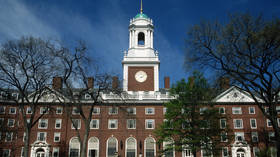Practicing Christians more skeptical of AI – poll

Practicing Christians and “scripture-engaged believers” in the US are more skeptical of rapidly developing artificial intelligence (AI) than the public as a whole, according to a new survey by the American Bible Society.
In its second chapter of the annual ‘State of the Bible’ report released last week, the nonprofit organization examined respondents’ opinions about the technology and what role it plays in their faith. The study was based on 2,506 online interviews with American adults across all states.
The findings showed that levels of uncertainty about AI were high across the board, with 68% of the general public disagreeing with the idea that AI could “promote spiritual health” and 58% of people disagreeing that AI could “aid in moral reasoning.”
Regardless of scriptural engagement or biblical allegiance, the report said “everyone is uncertain how a future with AI could look.” At the same time, slightly more than half of respondents agreed that AI would bring about an increase in unemployment.
“Americans are more fearful than hopeful about Artificial Intelligence,” stated John Farquhar Plake, American Bible Society’s Chief Program Officer and State of the Bible Editor-in-Chief. He added that while the survey shows “a great deal of uncertainty” across the board, “the greatest uncertainty is at the intersection of faith and AI.”
Scripture-engaged Americans are “slightly more” concerned about artificial intelligence compared to Americans as a whole, the study found. Similarly, they were more likely than their peers to express agreement with negative statements about AI.
The scripture-engaged showed an average “agreement score” of 3.1 on the belief that the use of AI “goes against biblical teaching,” compared with an agreement score of 2.7 for the general public. Similarly, they were more likely to agree that the bad outweighs the good when it comes to AI.
The average level of agreement that AI would lead to increased unemployment was also highest among practicing Christians, followed by non-practicing Christians and non-Christians.
The idea of a priest using AI to develop sermons was also more objectionable among practicing Christians than non-practicing or non-Christians.
The non-profit’s survey found that contrary to popular assumption, Gen Z’s were not more positive regarding AI than older generations, despite their comfort with technology as “digital natives.” In fact, Gen Z are “most concerned” about how AI will affect their livelihood, fearing they lack AI skills to maintain their jobs, according to the report.














